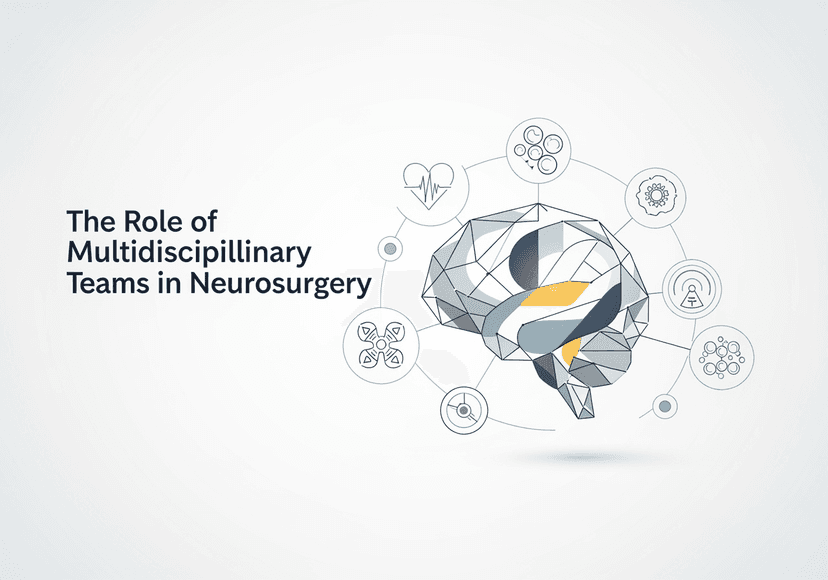
Who Should Consider Spine Surgery? Healthtrip Expert Insights
14 Oct, 2025
 Healthtrip
Healthtrip- Understanding Spine Surgery: A Primer
- When is Spine Surgery Necessary? Identifying Key Indicators
- Who is an Ideal Candidate for Spine Surgery? Patient Profiles
- Evaluating Your Options: Alternatives to Spine Surgery
- Expert Insights: Consulting with Specialists and Second Opinions - NMC Specialty Hospital, Al Nahda, Dubai and Memorial Sisli Hospital
- Recovery and Rehabilitation: What to Expect After Spine Surgery - Bangkok Hospital
- Patient Success Stories: Real-Life Examples of Spine Surgery Outcomes - Vejthani Hospital
- Conclusion: Making an Informed Decision About Spine Surgery
When Conservative Treatments Fall Short
Before even contemplating spine surgery, it’s crucial to exhaust all non-surgical options. Think of it as building a strong foundation before constructing a skyscraper – you need to ensure the basics are in place. Physical therapy, for example, can work wonders in strengthening your core muscles, improving flexibility, and reducing pain. Pain management techniques, such as medication, injections, and nerve blocks, can provide temporary relief and allow you to participate more actively in physical therapy. Lifestyle modifications, like weight loss, smoking cessation, and ergonomic adjustments at work and home, also play a significant role in managing back pain. But, what happens when these efforts aren’t enough? When the pain persists despite months of diligent effort, when it significantly impacts your ability to work, sleep, or enjoy life, and when diagnostic imaging reveals structural issues that can't be resolved with conservative methods, then it might be time to consider that spine surgery is a viable option. Healthtrip can assist you in connecting with specialists at hospitals like the Saudi German Hospital Cairo, Egypt or Vejthani Hospital who can evaluate your case and determine if surgery is the right path for you.
Most popular procedures in India
Specific Spinal Conditions That May Benefit from Surgery
Not all back pain is created equal. Some spinal conditions are more likely to respond well to surgical intervention than others. Consider spinal stenosis, a narrowing of the spinal canal that puts pressure on the spinal cord and nerves. This pressure can cause pain, numbness, and weakness in the legs and feet. In severe cases, surgery to decompress the spinal canal can provide significant relief. Similarly, herniated discs, where the soft cushion between the vertebrae bulges or ruptures, can compress nearby nerves, leading to excruciating pain. A discectomy, a surgical procedure to remove the herniated portion of the disc, can alleviate this pressure and restore normal function. Spondylolisthesis, a condition where one vertebra slips forward over another, can also cause pain and instability. Spinal fusion, a procedure to join two or more vertebrae together, can stabilize the spine and reduce pain. Scoliosis, an abnormal curvature of the spine, may require surgical correction, especially in severe cases or when it progresses rapidly. Healthtrip provides access to hospitals such as Quironsalud Hospital Murcia and Hisar Intercontinental Hospital, where experts are skilled in diagnosing and treating these conditions with the latest surgical techniques.
The Importance of a Thorough Diagnosis
Before jumping to any conclusions, let's talk diagnostics. A comprehensive evaluation is absolutely essential to determine the root cause of your back pain and whether or not surgery is truly the best solution. This typically involves a thorough physical examination, a review of your medical history, and advanced imaging studies, such as X-rays, MRI scans, and CT scans. These imaging tests can reveal the underlying anatomical issues, such as herniated discs, spinal stenosis, or vertebral fractures. In some cases, nerve conduction studies may be performed to assess the function of the nerves and identify any areas of compression or damage. It’s like detective work, piecing together all the clues to solve the mystery of your pain. A proper diagnosis is crucial because it ensures that the surgery targets the specific problem causing your symptoms. Healthtrip can facilitate consultations with top-notch doctors at facilities like Bangkok Hospital or Fortis Memorial Research Institute, Gurgaon, who can provide an accurate diagnosis and guide you toward the most appropriate treatment plan. Remember, the right diagnosis is half the battle won!
Wellness Treatments
Give yourself the time to relax
Lowest Prices Guaranteed!

Lowest Prices Guaranteed!
When Neurological Symptoms are Present
When pain radiates down your leg like a lightning bolt, or when you start experiencing numbness, tingling, or weakness in your limbs, it’s a sign that something is seriously impinging on your nerves. These neurological symptoms can indicate nerve compression caused by a herniated disc, spinal stenosis, or other spinal conditions. If these symptoms are severe or progressive, and if they don't respond to conservative treatments, surgery may be necessary to relieve the pressure on the nerves. Left untreated, nerve compression can lead to permanent nerve damage, including loss of sensation, muscle weakness, and even paralysis. The goal of surgery in these cases is to decompress the affected nerves, restoring their normal function and preventing further damage. Healthtrip can help you find experienced neurosurgeons at hospitals such as LIV Hospital, Istanbul, or Saudi German Hospital Alexandria, Egypt, who specialize in treating nerve compression and restoring neurological function. Don't let nerve pain dictate your life; Healthtrip is here to connect you with the right experts who can help you regain control.
The Role of Age and Overall Health
While age is just a number, it can play a role in determining whether or not spine surgery is the right choice for you. Older patients may have multiple health conditions that increase the risks associated with surgery. However, age alone is not a contraindication for surgery. Many older adults experience significant relief and improved quality of life after spine surgery. Your overall health is even more important than your age. Patients with chronic conditions such as diabetes, heart disease, or obesity may be at higher risk of complications. It's important to have these conditions well-managed before undergoing surgery. A thorough evaluation by your primary care physician and a specialist, facilitated by Healthtrip, can help determine if you are a good candidate for surgery. Factors like bone density, smoking habits, and nutritional status also play a crucial role in healing, making hospitals like Pantai Hospital Kuala Lumpur, Malaysia and Helios Klinikum Erfurt a great option for world class treatment. Healthtrip ensures that you receive a comprehensive pre-operative assessment to minimize risks and maximize the chances of a successful outcome.
Healthtrip: Your Partner in Spinal Health
Choosing spine surgery is a big decision, and you don't have to make it alone. Healthtrip is here to be your trusted partner, providing you with the information, resources, and support you need every step of the way. We can help you find the best hospitals and surgeons around the world, like Mount Elizabeth Hospital or Jimenez Diaz Foundation University Hospital, based on your specific needs and preferences. We offer personalized assistance with everything from arranging consultations and travel logistics to navigating insurance and payment options. Our goal is to make your journey to spinal health as smooth and stress-free as possible. We believe that everyone deserves access to high-quality, affordable healthcare, and we're passionate about connecting patients with the best possible treatment options. Whether you're just starting to explore your options or you're ready to schedule your surgery, Healthtrip is here to help you regain control of your life and live pain-free. Let us be your guide on this path to a healthier, happier you.
Understanding Spine Surgery: A Primer
Spine surgery. Just hearing those two words can send shivers down your spine (pun intended!). It's a big decision, and understanding what it entails is the first step towards making an informed choice about your health. Think of your spine as the central pillar of your body, a complex structure of bones, ligaments, muscles, and nerves working together to keep you upright and moving. When something goes wrong with this intricate system, whether it's a slipped disc, spinal stenosis, or scoliosis, the pain and limitations can be debilitating. Spine surgery aims to correct these problems, alleviate pain, and restore function. But it's not a one-size-fits-all solution. There are various types of spine surgery, each designed for specific conditions. From minimally invasive procedures that involve small incisions and quicker recovery times, to more complex operations that address severe spinal deformities, the options are diverse. The key is to understand the nature of your specific spinal issue and what kind of surgical intervention might be the most appropriate and effective. Remember, knowledge is power, and the more you understand about spine surgery, the better equipped you'll be to navigate this often-daunting healthcare journey. Healthtrip can help connect you with the right specialists and resources to guide you through every step.
When is Spine Surgery Necessary? Identifying Key Indicators
So, when do you cross that bridge and consider spine surgery? It's rarely the first option. Doctors typically recommend surgery after non-surgical treatments, like physical therapy, pain medication, and injections, have failed to provide adequate relief. Consider it a last resort, a strategic move when other tactics haven't won the battle against pain and limited mobility. One of the primary indicators is persistent, severe pain that interferes with your daily life. We're not talking about the occasional twinge after a long day; we're talking about unrelenting pain that keeps you from sleeping, working, or enjoying your favorite activities. Neurological symptoms are another red flag. These can include numbness, tingling, weakness, or even loss of bowel or bladder control. These symptoms suggest that the spinal cord or nerves are being compressed, and if left untreated, can lead to permanent damage. Progressive neurological deficits, meaning the symptoms are getting worse over time, are a particularly concerning sign. In some cases, structural problems like spinal instability or severe deformities may necessitate surgery. These conditions can put excessive pressure on the spinal cord and nerves, leading to pain and neurological problems. But remember, a diagnosis alone isn't enough. The decision to have spine surgery should be a collaborative one, made between you and your doctor, weighing the potential benefits and risks. And that's where Healthtrip comes in, offering access to a network of experienced spine specialists who can provide personalized guidance and support.
Who is an Ideal Candidate for Spine Surgery? Patient Profiles
Not everyone with back pain is a suitable candidate for spine surgery. Identifying the "ideal" candidate involves a careful evaluation of several factors. Firstly, the patient's overall health plays a crucial role. Individuals with significant medical conditions, such as uncontrolled diabetes, heart disease, or obesity, may face higher risks during and after surgery. Secondly, the patient's psychological state is equally important. Patients with untreated depression or anxiety may have a more challenging recovery. A strong commitment to rehabilitation is also essential. Spine surgery is not a quick fix; it requires dedicated effort to follow the prescribed physical therapy regimen and make necessary lifestyle changes. Realistic expectations are key. Patients should understand the potential benefits and limitations of surgery and have a clear understanding of the recovery process. The ideal candidate typically has a well-defined spinal problem that correlates with their symptoms and has failed to respond to conservative treatments. They are motivated, informed, and understand the risks and benefits involved. Think of it like this: spine surgery is a team effort, and the patient is the captain. They need to be actively involved in the decision-making process and committed to playing their part in the recovery process. If you're wondering whether you fit the profile of an ideal candidate, Healthtrip can connect you with reputable hospitals like Saudi German Hospital Alexandria, Egypt or Fortis Memorial Research Institute, Gurgaon, offering comprehensive evaluations and expert opinions to help you determine the best course of action.
Also Read:
Evaluating Your Options: Alternatives to Spine Surgery
Before diving into the world of spine surgery, it's absolutely crucial to explore all possible non-surgical avenues for managing your back pain. Think of it as building a strong foundation before considering major construction on a house. These alternatives aren't just about delaying the inevitable; for many, they can provide significant relief and improved quality of life. One of the first lines of defense is often physical therapy. A skilled physical therapist can assess your specific condition, identify muscle imbalances or weaknesses, and create a tailored exercise program to strengthen your core, improve flexibility, and alleviate pain. It's like having a personal trainer for your spine! Combining this with lifestyle adjustments like maintaining a healthy weight, practicing good posture, and using proper lifting techniques can work wonders. Over-the-counter pain relievers such as ibuprofen or acetaminophen can help manage mild to moderate pain, while prescription medications like muscle relaxants or nerve pain medications might be necessary for more severe cases. Injections, such as epidural steroid injections, can also provide temporary pain relief by reducing inflammation around the spinal nerves. Don't underestimate the power of complementary therapies like acupuncture or chiropractic care, either. While scientific evidence may vary, many individuals find these approaches helpful in managing their pain and improving their overall well-being. Remember, finding the right combination of treatments is often a process of trial and error, so it's important to work closely with your healthcare team to develop a personalized plan that addresses your specific needs.
It's always smart to consult with multiple providers to see what different solutions can be offered. Consulting with specialists at hospitals like Saudi German Hospital Cairo, Egypt can help you understand the best course of action.
Expert Insights: Consulting with Specialists and Second Opinions - NMC Specialty Hospital, Al Nahda, Dubai and Memorial Sisli Hospital
Navigating the world of spine surgery can feel like trekking through a dense jungle without a map. That's where expert opinions and second opinions come into play. Imagine you're planning a major trip – you wouldn't just rely on one travel blog, would you? You'd gather information from multiple sources, compare itineraries, and seek advice from seasoned travelers. The same principle applies to your health. Consulting with specialists offers you a chance to gain a deeper understanding of your condition, explore all available treatment options, and make informed decisions about your care. Hospitals renowned for their expertise in spine care, such as NMC Specialty Hospital, Al Nahda, Dubai and Memorial Sisli Hospital, Turkey, often have multidisciplinary teams of spine surgeons, neurologists, pain management specialists, and physical therapists who can provide a comprehensive evaluation and personalized treatment plan. Seeking a second opinion is not about doubting your doctor's competence; it's about empowering yourself with knowledge and ensuring that you're making the best possible choice for your health. A second opinion can provide you with a different perspective, confirm the initial diagnosis, or highlight alternative treatment options that you may not have been aware of. It's like having a fresh pair of eyes reviewing your case, catching details that might have been overlooked. More than that, consider options near you for convenience to reduce travel hassles. For example, NMC Royal Hospital, DIP, Dubai is nearby NMC Specialty Hospital, Al Nahda, Dubai and may be a good option.
Don't hesitate to ask questions, express your concerns, and actively participate in the decision-making process. Your healthcare team should be your allies, working collaboratively to help you achieve your goals. And remember, Healthtrip can assist you in connecting with leading spine specialists and obtaining second opinions from top hospitals around the world, ensuring that you have access to the best possible care.
Recovery and Rehabilitation: What to Expect After Spine Surgery - Bangkok Hospital
Recovering from spine surgery is a marathon, not a sprint. It's a journey that requires patience, commitment, and a realistic understanding of what to expect. Think of it as rebuilding a house after a major renovation – it takes time, effort, and a well-structured plan to get everything back in order. The immediate post-operative period typically involves pain management, wound care, and gradual mobilization. You might experience some discomfort, swelling, or stiffness, but these symptoms can usually be managed with medication and physical therapy. As you progress through your recovery, you'll gradually increase your activity level and begin working on strengthening your muscles and improving your flexibility. Physical therapy plays a crucial role in this process, helping you regain your strength, mobility, and function. They can help with specialized machines like a AlterG Anti-Gravity Treadmill, which can be found at facilities like Bangkok Hospital. Your physical therapist will design a personalized exercise program that addresses your specific needs and goals, guiding you through each step of the way. Adhering to your surgeon's instructions and attending all scheduled therapy sessions are essential for a successful recovery. It's also important to listen to your body and avoid pushing yourself too hard, too soon. Gradually increasing your activity level and pacing yourself will help prevent setbacks and ensure that you're making steady progress. Lifestyle modifications, such as maintaining a healthy weight, practicing good posture, and avoiding activities that strain your back, can also contribute to a smoother recovery. Don't be afraid to seek support from friends, family, or support groups. Sharing your experiences and connecting with others who have gone through similar journeys can provide valuable emotional support and motivation. Remember, recovery is a process, and there will be ups and downs along the way. Be patient with yourself, celebrate your progress, and stay focused on your goals. With dedication and the right support, you can achieve a successful recovery and regain your quality of life.
Facilities like Bangkok Hospital are a great resource for recovery and rehab as well. In addition, facilities like Vejthani Hospital and Yanhee International Hospital can be also great resources.
Patient Success Stories: Real-Life Examples of Spine Surgery Outcomes - Vejthani Hospital
Sometimes, the most powerful way to understand the potential of spine surgery is to hear from those who have actually experienced it. Patient success stories offer a glimpse into the real-life outcomes of this procedure and can provide hope and inspiration to those considering it. Imagine reading a biography of someone who overcame incredible odds – their story can motivate you to pursue your own dreams, right? Similarly, reading about patients who have regained their mobility, reduced their pain, and improved their quality of life after spine surgery can be incredibly encouraging. These stories often highlight the challenges and triumphs of the recovery process, providing valuable insights into what to expect along the way. They also demonstrate the importance of choosing the right surgeon, adhering to the rehabilitation plan, and maintaining a positive attitude. For example, Vejthani Hospital highlights stories of patients who have received life-changing procedures. Each story is unique, but they all share a common thread: a renewed sense of hope and possibility. While success stories can be inspiring, it's important to remember that every individual's experience is different. Spine surgery is not a guaranteed cure, and outcomes can vary depending on the individual's condition, overall health, and adherence to the treatment plan. However, these stories serve as a reminder that positive outcomes are possible and that spine surgery can be a life-changing option for those who are suffering from chronic back pain or spinal disorders. Moreover, consider different solutions for your particular condition at facilities like Fortis Memorial Research Institute, Gurgaon
Conclusion: Making an Informed Decision About Spine Surgery
Deciding whether or not to undergo spine surgery is a deeply personal and complex decision. It's not like choosing between pizza or pasta for dinner; it's a life-altering choice that requires careful consideration, thorough research, and open communication with your healthcare team. Think of it as planning a major life event – you wouldn't just wing it, would you? You'd weigh the pros and cons, gather information, seek advice, and make a decision that feels right for you. Throughout this blog, we've explored various aspects of spine surgery, from understanding the procedure itself to evaluating alternative treatment options and hearing real-life success stories. We've emphasized the importance of consulting with specialists, seeking second opinions, and understanding the recovery process. Armed with this knowledge, you can approach your decision with greater confidence and clarity. It's important to remember that there is no one-size-fits-all answer when it comes to spine surgery. What works for one person may not work for another. The best decision is the one that is tailored to your individual needs, goals, and values. Take your time, gather information from reputable sources, and don't hesitate to ask questions. Your healthcare team is there to support you and guide you through the process. And remember, Healthtrip is here to assist you in connecting with leading spine specialists, obtaining second opinions, and accessing high-quality care around the world. Ultimately, the decision to undergo spine surgery is yours to make. By being informed, proactive, and engaged, you can make the best possible choice for your health and well-being. Also look at facilities like LIV Hospital, Istanbul for information.
Also Read:
Related Blogs

Role of Multidisciplinary Teams in Neuro Surgery
Detailed guide on neuro surgery, featuring doctors, hospitals, risks, recovery,

Healthtrip's Trusted Hospitals for International Neuro Surgery Patients
Detailed guide on neuro surgery, featuring doctors, hospitals, risks, recovery,

Who Should Consider Neuro Surgery? Healthtrip Expert Insights
Detailed guide on neuro surgery, featuring doctors, hospitals, risks, recovery,

Comparing Success Rates of Neuro Surgery Across Healthtrip Hospitals
Detailed guide on neuro surgery, featuring doctors, hospitals, risks, recovery,

Latest Techniques Used for Neuro Surgery in India via Healthtrip
Detailed guide on neuro surgery, featuring doctors, hospitals, risks, recovery,

Healthtrip's Process for Booking Your Neuro Surgery in India
Detailed guide on neuro surgery, featuring doctors, hospitals, risks, recovery,










